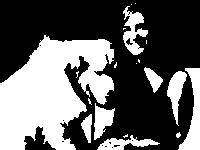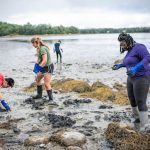
Sarah Glaser '11
For two weeks over spring break, Sarah Glaser got a crash course in state politics.
Through a serendipitous connection made through the McKeen Center, Glaser ’11 shadowed State Representative Anne Graham for several days as the democratic legislator caucused, voted on legislation and engaged in tete-a-tetes with other legislators.
The McKeen Center for the Common Good is exploring how to connect more students to the state legislature, and to have more students, like Glaser, shadow legislators during session.
“Sarah jumped at the chance to be involved in this project and made it happen. Increasingly we find our students interested in policy and determining ways to address the root causes of the issues they learn about through their work in the community. Maine has one of the most accessible legislatures in the country, and in this era, we need young people to understand how government works and to see, first-hand, the messy work of democracy. We want our students to be thinking about policy; but to move ‘good policy’ forward, they also have to understand ‘good politics.’ Experiencing the legislative system at the state level is one way to begin to see where these meet.
As more opportunities arise to connect students to the Legislature, it will be important to have them work with both parties, and include students with different political perspectives. Ultimately, we want to help the next generation learn how to ‘find common ground for the common good’ and embrace the chance to work with others who think differently from them about how to solve problems – an example perhaps our students can serve at this point in our society, as it is not always being modeled well by adults.”
Susie Dorn, director of the McKeen Center for the Common Good
Glaser is majoring in environmental studies and sociology with a focus in criminology, and says she’s interested in both environmental and criminal justice advocacy. By observing the state house in action, Glaser added another layer to her academic studies. In just a few days, she was quickly brought up to speed on how laws are made. “It’s very fast-paced,” she said. “It’s now clearly a lot more tangible and understandable to me how the process works and how deeply influential a few people are.”
Glaser says she was most fascinated to see “the behind-the-scenes stuff,” such as the intense lobbying around proposed bills, and to overhear the happenstance conversations between legislators as they crossed paths in hallways. While in Augusta, Glaser was also able to connect with three Bowdoin alumni who are serving in the state Legislature: Alex Cornell du Houx ’08, Terry Hayes ’80 and W. Bruce MacDonald ’60.
In a memo she prepared for the McKeen center, Glaser wrote, “One of the most interesting aspects for me was the Democratic caucus – the strategy and explanations of the bills before they go to chamber. Chamber is great because you get to see the legislative action in its process and learn the vocabulary. Committees are fascinating, especially if they involve an issue that one wants to look at more in-depth. I recommend that students be able to follow a bill, if possible, through multiple work sessions and public hearings.”
Glaser, who will graduate in May, has made a point as a student of joining community engagement with “the more abstract nature of academic learning,” as she puts it. For example, after receiving a Global Citizens Grant in 2009, she volunteered at an after-school literacy and arts program in San José, Costa Rica. When she came home, she raised money to return the following winter break with other Bowdoin students to run a camp for the children. She later completed an independent study in sociology, one of three independent studies she’s undertaken, on media coverage of the San José neighborhood in which she worked. For more on Glaser, read this profile by the McKeen Center.
This semester, she’s taking a seminar with government professor Allen Springer on international and humanitarian law, a class that both helped prepare her for her spring break experience and will now be shaped by her new insight. “Even though we weren’t looking at international issues in the Legislature, the local to international scope is fascinating and the process of the formation of the laws is very different than I expected,” Glaser said. “And on a practical level, much of the legal language is the same – language that I have to learn to apply in class and had to interpret on the floor.”
Glaser will graduate in May and work as a forestry ranger in Alaska’s back-country for the summer. She then plans to attend a vocational school there to get a welding degree, a fairly unorthodox move for a graduate with a liberal arts degree, but one in keeping with Glaser’s philosophy of combining academic education with on-the-ground experience. Plus, she points out that a welding degree will provide a dependable source of income as she starts her career.
“I believe very strongly in the intersection between vocational-technical and academic skills,” she explains. “I hope to work in welding for a couple of years in Alaska, where the skills are useful in industries such as resource extraction and ship building. The industry is seasonal and well-paying. From a practical standpoint, I may be able to weld in the summer while paying for business school or continuing to work in international art trade in the winter.”
She also is working with her sister and a group of young people in her hometown of Moose Pass, population 200, to create a co-op for artists and technicians. She and her sister bought five acres with a large garage and shop that they plan on turning into a community-work space, with an air compressor, kiln, dark room and carpentry equipment.
